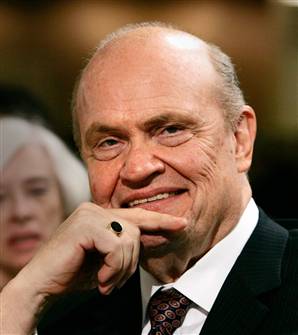Today’s WSJ: [1]
Fred Thompson’s Presidential campaign has been struggling, in part because of a sense that he lacks passion and an agenda. But late last week he unveiled a tax reform that is more ambitious than anything we’ve seen so far from the rest of the GOP field.
Hmmm.
I’d noticed the proposal of course, (usually offered within the context of a comparison to the “Fair Tax” proposal from Neal Boortz and company) but I had not previously seen it mentioned within the context of the remainder of the Republican field of hopefuls.
It strikes me, that this comment puts Mr. Thompson directly on line with what I had mentioned previously [2] about him not wanting to keep too early in the campaign. the one it comes to campaigns, Fred Thompson is a come from behind a sort of fellow, and so he feels comfortable there, I think.
Also, it would seem that Fred has chosen himself a winner of a flight to wave:
Mr. Thompson is getting aboard what has become a global bandwagon, with more than 20 nations having adopted some form of flat tax. Most–especially in Eastern Europe–have seen their economies grow and revenues increase as they’ve adopted low tax rates of between 13% and 25% with few exemptions.
The main political obstacle to such a reform in the U.S. has come from liberals, who favor punitive taxes for “class” reasons, and K Street corporate lobbyists who want to retain their tax-loophole empires. The housing and insurance industries, states and localities, charities, bond traders and tax preparers are all foes of low tax rates.
That’s why the idea of a voluntary flat tax–introduced on these pages a dozen years ago–makes political sense. The Thompson plan would allow taxpayers to keep their mortgage and charitable deductions if they prefer, by adhering to the current tax code and rates. But it would also allow the option to abandon those credits and deductions except for a single allowance based on family size ($39,000 for a family of four). Most taxpayers would pay a 10% rate on income above that allowance, with a 25% rate kicking in at $100,000 for a couple. There would only be five lines on the tax form and most taxpayers could fill it out in minutes.
Liberals are already objecting that the plan is not “paid for,” by which they mean it doesn’t raise taxes the way they hope the next President will. But Mr. Thompson is right in refusing to play by the “static revenue” scoring game that demands that one dollar in estimated tax cuts be offset by one dollar in estimated tax increases somewhere else. “The experts always overrate the revenue losses from tax cuts,” Mr. Thompson says, and history supports him going back to the Mellon reductions of the 1920s, the Kennedy tax cuts of the 1960s, the Gipper’s in the 1980s, and this decade’s success with President Bush’s reductions.
 [3]It seems to me, that that is precisely the company that Fred Thompson wants to keep, just now.
[3]It seems to me, that that is precisely the company that Fred Thompson wants to keep, just now.
Certainly, we can expect powerful objections to come from the bodies that the article mentions the lobbyists, the housing and insurance industries, lawyers, indeed, all of the usual suspects on the financial backers of left wing causes, but I would be most interested in seeing the reactions of the proponents of Boortz’ “Fair Tax” to this proposal from Thompson.
Backers of proposals like that would do well to fall in line behind Fred Thompson on this one.
Wouldn’t it be interesting for somebody in Fred Thompson’s campaign, to run up a comparison between the tax proposal Fred is talking about, just now, and the one that Charlie Rangel ran up the flagpole for Hillary Clinton a few weeks ago? I mean, if I’m Fred, I’m not letting the Democrats off the hook, for that one. This proposal of his is a perfect opportunity to draw a rather stark line between the goals and objectives of each party’s policies. You know was well as I do, that a tax hike isn’t selling most years, including this one, particularly a tax increase of the size proposed by the Democrats. Very loudly drawing the comparison between the two, would be the relative equivalent of taking a sledge hammer to the presidential hopes of the whole of the list of Democrat presidential hopefuls.
It also wouldn’t hurt in the congressional races.
More, Memeorandum